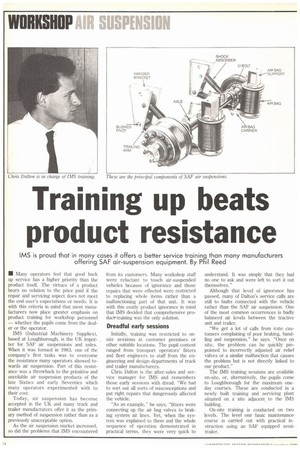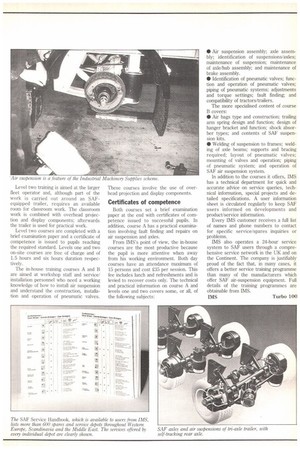Training up beats product resistance
Page 106

Page 107

If you've noticed an error in this article please click here to report it so we can fix it.
• Many operators feel that good back up service has a higher priority than the product itself. The virtues of a product bears no relation to the price paid if the repair and servicing aspect does not meet the end user's expectations or needs. It is with this criteria in mind that most manufacturers now place greater emphasis on product training for workshop personnel — whether the pupils come from the dealer or the operator.
IMS (Industrial Machinery Supplies), based at Loughborough, is the UK importer for SAF air suspensions and axles. When it was formed in 1983, one of the company's first tasks was to overcome the resistance many operators showed towards air suspension. Part of this resistance was a throwback to the primitive and unreliable air suspension products of the late Sixties and early Seventies which many operators experimented with to their cost.
Today, air suspension has become accepted in the UK and many truck and trailer manufacturers offer it as the primary method of suspension rather than as a previously unacceptable option.
As the air suspension market increased, so did the problems that IMS encountered from its customers. Many workshop staff were reluctant to touch air-suspended vehicles because of ignorance and those repairs that were effected were restricted to replacing whole items rather than a malfunctioning part of that unit. It was with this costly product ignorance in mind that IMS decided that comprehensive product-training was the only solution.
Dreadful early sessions
initially, training was restricted to onsite sessions at customer premises or other suitable locations. The pupil content ranged from transport operators' fitters and fleet engineers to staff from the engineering and design departments of truck and trailer manufacturers.
Chris Dalton is the after-sales and service manager for IMS and remembers those early sessions with dread. "We had to sort out all sorts of misconceptions and put right repairs that dangerously affected the vehicle.
"As an example," he says, "fitters were connecting up the air bag valves to braking system air lines. Yet, when the system was explained to them and the whole sequence of operation demonstrated in practical terms, they were very quick to understand. It was simply that they had no one to ask and were left to sort it out themselves."
Although that level of ignorance has passed, many of Dalton's service calls are still to faults connected with the vehicle rather than the SAF air suspension. One of the most common occurrences is badly balanced air levels between the tractive unit and trailer.
"We get a lot of calls from irate customers complaining of poor braking, handling and suspension," he says. "Once on site, the problem can be quickly pinpointed to incorrectly adjusted air relief valves or a similar malfunction that causes the problem but is not directly linked to our product."
The IMS training sessions are available on-site, or, alternatively, the pupils come to Loughborough for the maximum oneday courses. These are conducted in a newly built training and servicing plant situated on a site adjacent to the IMS building.
On-site training is conducted on two levels. The level one basic maintenance course is carried out with practical instruction using an SAF equipped semitrailer. Level two training is aimed at the larger fleet operator and, although part of the work is carried out around an SAFequipped trailer, requires an available room for classroom work. The classroom work is combined with overhead projection and display components; afterwards the trailer is used for practical work.
Level two courses are completed with a brief examination paper and a certificate of competence is issued to pupils reaching the required standard. Levels one and two on-site courses are free of charge and of 1.5 hours and six hours duration respectively.
The in-house training courses A and B are aimed at workshop staff and service/ installation personnel who need a working knowledge of how to install air suspension and understand the construction, installation and operation of pneumatic valves. These courses involve the use of overhead projection and display components.
Certificates of competence
Both courses set a brief examination paper at the end with certificates of competence issued to successful pupils. In addition, course A has a practical examination involving fault finding and repairs on air suspension and axles.
From IMS's point of view, the in-house courses are the most productive because the pupil is more attentive when away from his working environment. Both day courses have an attendance maximum of 15 persons and cost 25 per session. This fee includes lunch and refreshments and is levied to recover costs only. The technical and practical information on course A and levels one and two covers some, or all, of the following subjects: • Air suspension assembly; axle assembly; identification of suspensions/axles; maintenance of suspension; maintenance of axle/hub assembly; and maintenance of brake assembly.
• Identification of pneumatic valves; function and operation of pneumatic valves; piping of pneumatic systems; adjustments and torque settings; fault finding; and compatibility of tractors/trailers.
The more specialised content of course B covers: • Air bags type and construction; trailing arm spring design and function; design of hanger bracket and function; shock absorber types; and contents of SAF suspension kits.
• Welding of suspension to frames; welding of axle beams; supports and bracing required; layout of pneumatic valves; mounting of valves and operation; piping of pneumatic system; and operation of SAF air suspension system.
In addition to the courses it offers, IMS has a technical department for quick and accurate advice on service queries, technical information, special projects and detailed specifications. A user information sheet is circulated regularly to keep SAF users informed on developments and product/service information.
Every IMS customer receives.a full list of names and phone numbers to contact for specific service/spares inquiries or problems.
IMS also operates a 24-hour service system to SAF users through a comprehensive service network in the UK and on the Continent. The company is justifiably proud of the fact that, in many cases, it offers a better service training programme than many of the manufacturers which offer SAF air-suspension equipment. Full details of the training programmes are obtainable from IMS.
IMS Turbo 100
































































































































